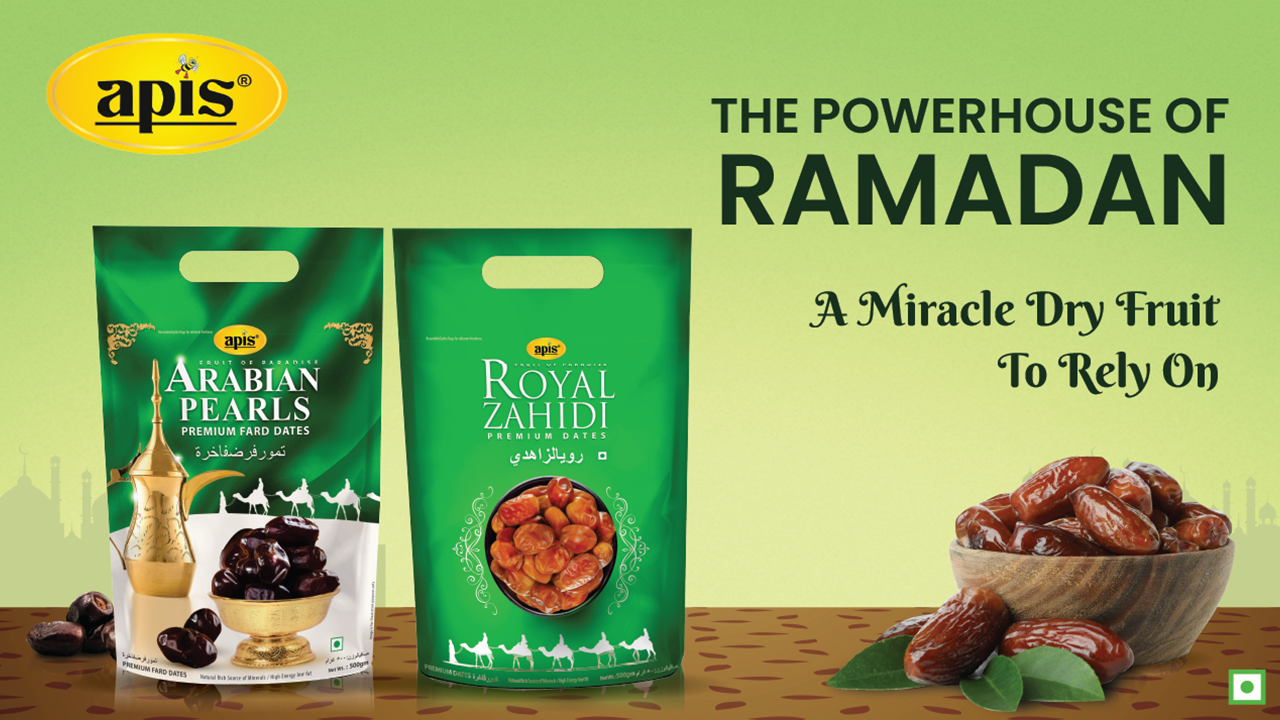“A miracle dryfruit to rely on”
The holy month of Ramadan occurs in the ninth month of the Islamic calendar,and is observed by several Islamicfollowers worldwide. This festivalis symbolic of their commitment toward community and God,reflected through prayers and fasting.
What is Ramadan?
It begins from one sighting of the crescent moon to the next, and is spread over 29-30 days.During this period, believers dedicate their love and concerns to Allah by fasting from dawn at around 4 -5.30 am to dusk around 7- 7.30pm. The pre-dawn meal is referred to as “suhur” and the night meal, which breaks the fast, is called “iftar.”
Fasting continues through the day without water, food or consumptionof anything else for almost 12 to 15 hours.To maintain such a fast in thehot month of April is indeed a daunting task. Hence, to stay hydrated and satiated, what one consumes in the two meals, before dawn and after dusk, become crucial.
A popular Islamic food
In Arabic countries, dates are a major agricultural crop, and play a big role in both Islamic tradition and their culinary delights. Dates are commonly used by the Islamic community through the year.
During Ramadan in particular, it acts as a super food providing great fibre that helps keep the stomach full for a longer time. Additionally, its sugar content keeps thirst in control.
It advised to consume dates during suhur or iftar to keep a balance of fluid and fibre so that the body functions well.
A powerhouse of nutrients
Dates are also symbolic of abundance. And that abundance extends to its dietary richness too. It is a great source of fiber, potassium and calcium.Dates are also high in body-building amino acids, vitamins A, B and C, as well as many minerals such as potassium, magnesium, calcium, sodium, iron, zinc, copper and selenium – truly a powerhouse of nutrients!
However, they are also mostly made up of simple carbohydrates, mainly glucose and fructose, and therefore like all foods, moderation is key when eating dates.It has been advised by many nutritionists to consume three to five dates in a day.
The miracle dry fruit has significant health benefits :
- Keeps the tummy full
It contains dietary fibres and pectin which attract water, increase the fluidity of stomach content, and therefore prolong the time spent in the stomach,providing a sense of satiety for a longer duration. It helps increase water intake which helps control appetite, and keeps the diet in check.
- Builds immunity
The effect of dates is associated with their beta-glycan content – a polysaccharide that isa better and more complex carbohydrate, often recommended by doctors. In addition, dates also contain high amounts of phenolic compounds and carotenoids, both of which have great cancer-fighting properties.Their vitamin content also supports the immune system as a result of their antimicrobial and antioxidant properties.
- Reduces sugar cravings
After fasting, the body runs toward carbohydrates and sweet foods. To avoid weight gain and sugar cravings, consuming dates is a healthier option, as the sweetness of dates is less harmful than other commercial desserts.
- Relieves constipation
To keep the digestion on track, dieticians prescribe at least 20 to 30 grams of fibre a day. Studies show that upping fibre intake increases stool volume, and shortens its intestinal transit time, thereby preventing constipation.
- Prevents acidity and indigestions
While fasting, acidity is likely, and dates provide the necessary fibre and sweetness to keep acidity in check.
- Improves heart health
Dates are an excellent source of potassium, an essential mineral responsible for maintaining the fluid and electrolyte balance in the body. Potassium is involved in ensuring neural conduction, regulating our pulse and blood pressure. Research reveals that a diet rich in potassium helps lower blood pressure and maintains cardiovascular health,reducing the risk of a stroke.
- Strengthens bones
Both calcium and calcium absorption are equally important for good bone health. Calcium and phosphorus are the two main minerals that work together to protect bone health. When taken together they aid calcium absorptionr. Dates have both these minerals,among others.
- Boosts energy and nervous system
Dates contain moderate levels of B1, vitamin B2 and niacin (B3), as well as vitamin B6, all of which help us meet our daily vitamin B requirements. All the B vitamins mentioned help metabolize carbohydrates, proteins and fats, ultimately extracting energy from these nutrients. They also facilitate the healthy functioning of the nervous system.
Prophet Muhammad and dates
Besides its scientific reasons, Muslims also cherish dates because of their association with Prophet Muhammad. Dates have been the staple food on Ramadan tables ever since Prophet Muhammad, who advised his believers to break their fasts with the sacred fruit.
As Ramadan approaches, the importance of dates becomes inevitable forits nutritional benefits and holy associations, as well as also for its unmatchable taste and blending characteristics in any food during the feast.
